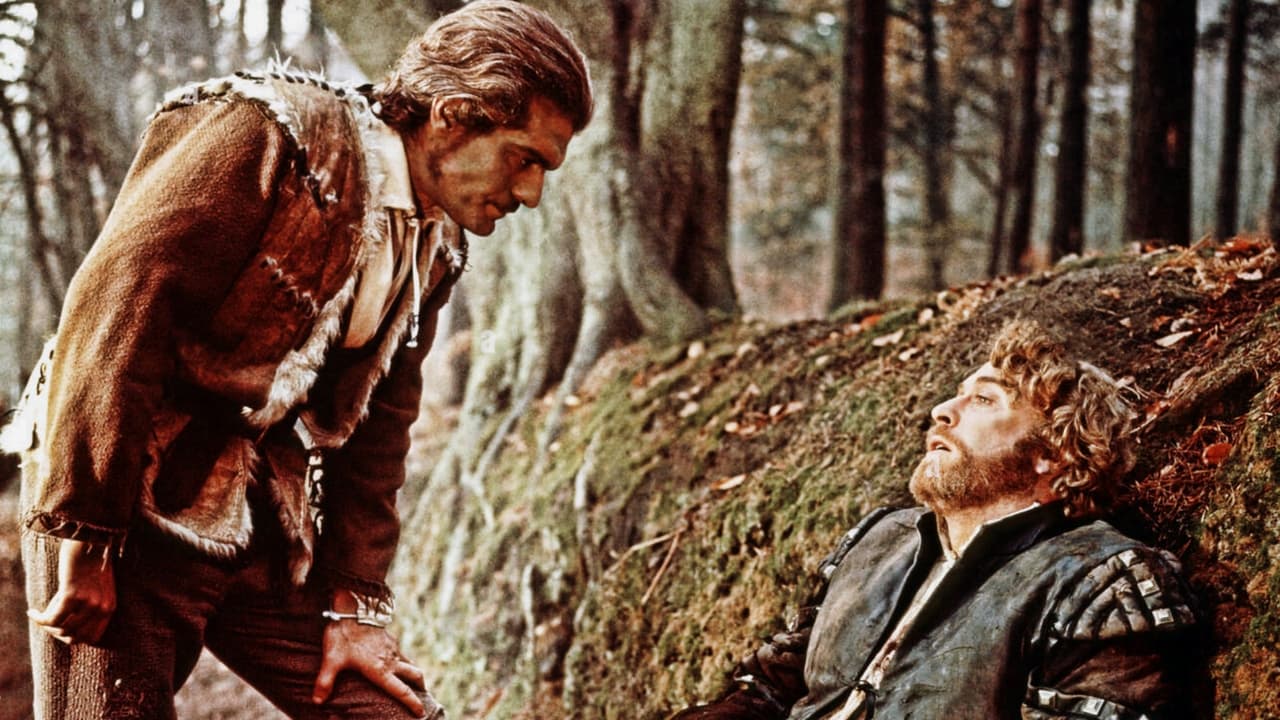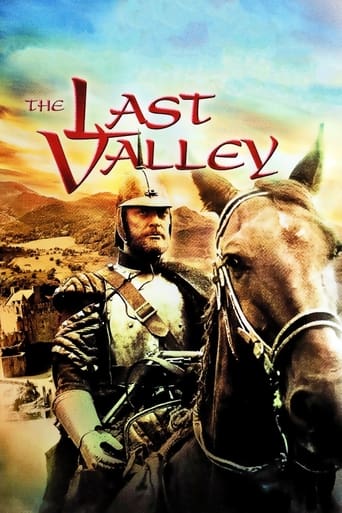

Instant Favorite.
... View MoreGood story, Not enough for a whole film
... View MoreInstead, you get a movie that's enjoyable enough, but leaves you feeling like it could have been much, much more.
... View MoreI didn’t really have many expectations going into the movie (good or bad), but I actually really enjoyed it. I really liked the characters and the banter between them.
... View MoreI remember this film in 1971,almost as much for the John Barry soundtrack, as i loved it. As an 18 year old the whole religious slant in the film, was music to my ears, as being brought up a catholic always raised questions about everything about my supposed faith. I found the film one of the most thought provoking movies, that i had ever seen.With fine performances by the cast, headed by Caine, and a great script, it held my interest throughout, even when i struggled to come to grips with 17th century Europe, as my history knowledge was found wanting. Should you want to see something completely different, then i would urge you to see this fine film
... View MoreI was interested in TLV for three reasons: Michael Caine is in it, Sean Penn isn't (too busy eating boogers in 1971), and for some reason I thought (or hoped) it would have a supernatural twist in it somewhere, a-la "Twilight Zone" perhaps; a sort of morality play with the interference of a higher power but without excessive, cheesy Hollywoodesque moralizing. Unfortunately, it's all "reality"-based, or it would be were it not so off-center.Perhaps it's the priest who stands out as the most unfathomable character. I like the way Per plays him, but his decisions were sometimes self-contradictory hence utterly unpredictable. Right up until the witch-burning it wasn't quite clear where he stands. Then again, the movie's tendency to not divide up ALL the characters into "good" and "evil" is what makes it more original than what one would usually expect to get from this kind of product. Omar's is the only very easy-to-understand and half-way sane character; he could almost be regarded as the token "modern man" who took a time machine and stepped a few centuries back in time. He is the voice of reason, a non-narrating narrator, a cultured alien in barbaric surroundings. Everyone else is tougher to figure out – because somewhat strange.Whether Caine's "transformation" from savage butcher to somewhat less savage butcher is realistic, I don't know. It was an age of extreme barbarism, so it wouldn't have been so easy to separate the genetically sociopathic degenerates from the "normal" folk who became savages simply because that was required of them from the unwritten laws of bare-knuckles survival. I do know, however, that the priest's behavior didn't always make sense, nor of some other characters. After the "witch" got burnt, one of Caine's men threw the priest into the fire. Huh? That was confusing; one of several such actions that served to baffle rather than enlighten. I wouldn't go so far as to say it was either illogical or dumb; after all, these people are all barbarians – pretty much animals in every way – so that many of their actions are based on pure impulse, not so much based on any kind of rationale, planning, or decision-making.It's useful to have movies like these, because they serve to remind the historically-illiterate movie-going rabble that the behaviour they're witnessing on the news these days from ISIS and other such barbaric Islamic butcher-cults is a carbon-copy of what was happening in Europe just a few centuries earlier – for thousands of years, I might add. It's also a much-needed reminder to all the Christians out there about the kinds of hobbies their respective denominations engaged in once upon a time, not that long ago. If Catholics, for example, truly KNEW and UNDERSTOOD what their church had done over the eons, all of them (apart from the sadistic and immoral ones) would convert to something entirely different.Not that I generally encourage movie-goers to get their history lessons from movies, let alone Hollywood flicks. 95% of all movie history is biased, mostly fabricated or even totally fabricated – a fact that is completely lost on the hordes of "atheist" Marxist western film-buff nerds who venerate film-makers to the point of divinity, which strikes me as an obvious irony considering their self-proclaimed godlessness.
... View MoreVogel a teacher treks through early 17th Century Germany . Stopping at a village it comes under attack by a mercenary force . Narrowly escaping with his life he comes across a village in a valley , Resting there he awakens only to find himself captured by the mercenary band . He is given two days to negotiate with the village elders and the villagers and mercenaries come to an uneasy alliance I first saw this movie perhaps as much as 30 years ago and despite forgetting its title do remember the cast names and the amount of violence it contained . This is a relatively brutal and violent film for its era , not so much gory but containing a brooding and nihilistic mood , worthy of the time its set in . I had little knowledge of the 30 Years War so had a quick look on Wikipedia and was shocked that it had as many as 8,000,000 casualties . The Great War of 1914-18 led to 10 million war deaths but you've got to put this in to perspective that war involved of millions of combatants from standing armies armed with the most effective weapons of slaughter ever devised at that point in human history . It says a lot about the horrors of the 30 Years Wars if millions of people were being killed by personal weapons like axes and swords . Worse too was the fact that no matter what none of the sides fighting would appeal to anyone on the side of secular democracy or humanism What this film does very well is point this fact out with the mercenary band led by the unnamed Captain being very pragmatic and ulterior because to give in to religious dogma would be to spell disaster though this doesn't make his character any nicer . Of course this means you're watching it from a 20th Century viewpoint with the voice of reason of Vogel being far too reasonable and anachronistic to be an entirely credible character from the period but it does paint a grim picture of the past with plague , famine feudalism and worst of all religious conflict blighting civilisation and I wonder how many people watching this film in 2013 were constantly reminded of Afghanistan ? As we all know Michael Caine has a very checkered career but 1971 was something of a vintage year for him with GET CARTER released at the same time . We don't get Caine's grating cockney tones and whilst his Germanic accent sounds more Dutch than German it never falls in to parody which is what easily could have happened . The supporting cast are also more than competent featuring a host of well known Brits like Davenport , Blessed , Gothard , Hogg , Shepard and Hallem but the stand out performance is Swedish actor Pers Oscarsson as Father Sebastian whose dogma is always in conflict against the pragmatic unbelieving Captain and it's this abrasive character interaction that makes the movie a must watch Some things don't work entirely and the story has a rather strange structure where a power struggle/revenge subplot that should be the natural climax taking place far sooner than it should . Indeed my memory cheated on this point and thought this where was the film ended on my first viewing of it . There's also a relatively unnecessary subplot about witchcraft but upon rewatching the film ( This movie demands to be seen more than once ) was slightly startled that perhaps this character may indeed have had second sight and might not have been an unnecessary subplot . But these are minor problems and apart from the excellent cast , intelligent subtext we also have fine cinematography alongside a haunting score from John Barry in a film that strangely flopped when it was released in 1971 and appears on TV stations very rarely
... View MoreSkip it – This is an exceedingly strange movie that blends war with the concept of a utopian society. It takes place in Germany during the Thirty Years War. War and plague have ravaged the entire country, except for one small hidden valley in the mountains. When a small band of soldiers, led by Michael Caine's character, discover this valley, they decide to join with the villagers in order to co-exist. Eventually, they must defend the valley from outsiders. The two main battle scenes that take place during the film are pretty good, but they are few and far between. Also, this film would have been better if it was made before 1970. The director decided to focus on religion rather than war. Although religion was the conflict that started the Thirty Years War, it is portrayed in a fanatical way that only the 1970's could offer.
... View More